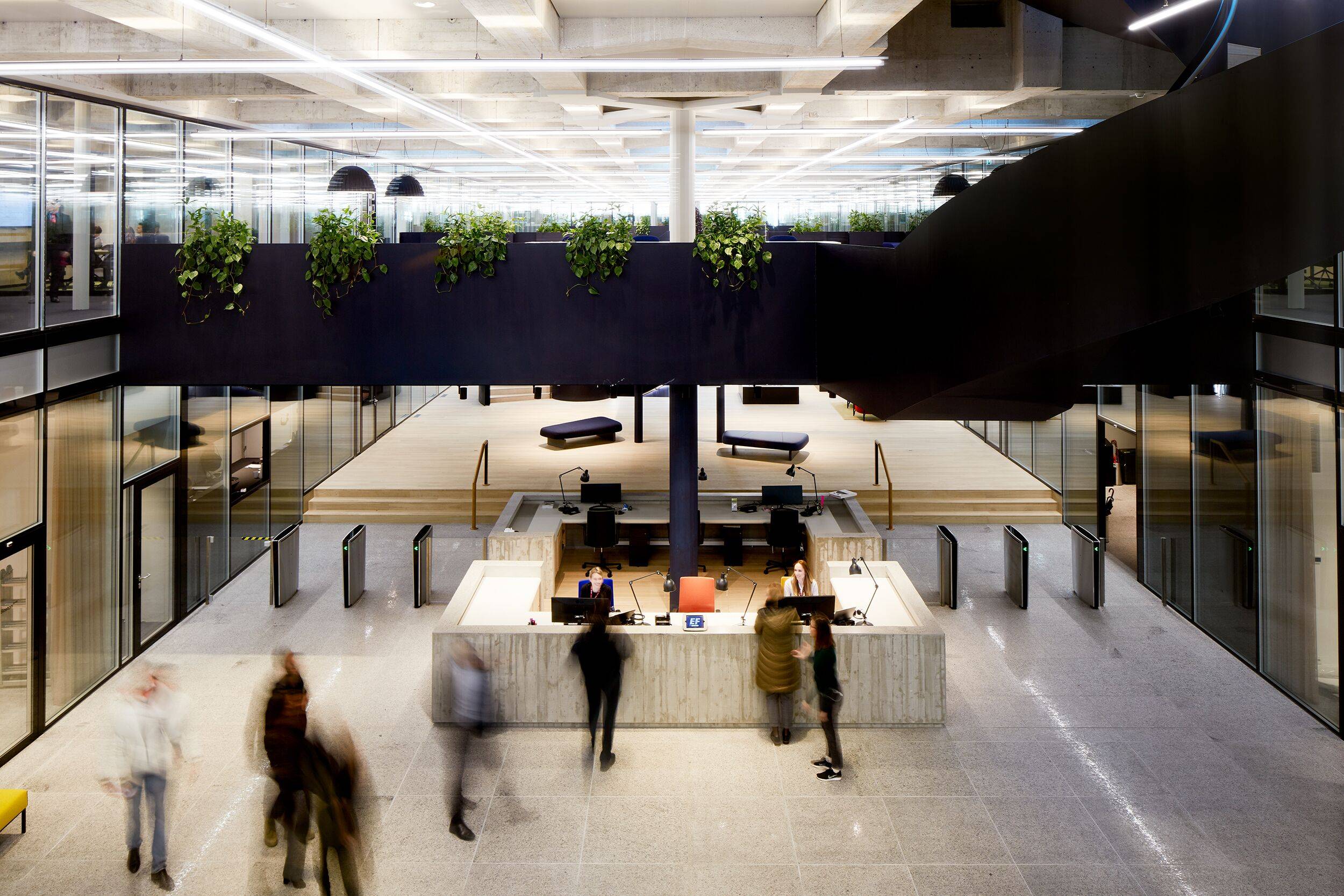 I often refer to Google and Facebook in my blog, due to their influence on workplace design. Many consider them to be workplace interior’s holy grail. But today’s big employers are competing with one another on a much broader set of principles. Cool interiors alone just won’t cut it. Zürich, like many European cities is home to a large number of global brands, with bustling financial services and tech sectors. I regularly hear of people with multiple job offers taking a job with a lower salary, rather than accepting a role in a company that doesn’t reflect their ideals. This decision can be influenced by office design and facilities, career development options, corporate culture and much more.
I often refer to Google and Facebook in my blog, due to their influence on workplace design. Many consider them to be workplace interior’s holy grail. But today’s big employers are competing with one another on a much broader set of principles. Cool interiors alone just won’t cut it. Zürich, like many European cities is home to a large number of global brands, with bustling financial services and tech sectors. I regularly hear of people with multiple job offers taking a job with a lower salary, rather than accepting a role in a company that doesn’t reflect their ideals. This decision can be influenced by office design and facilities, career development options, corporate culture and much more.
Shifting battleground calls for new strategies
Traditional PLCs previously considered the Steady Eddys of the business world are rolling out next gen offices with in-house yoga studios, barista coffee and agile work settings as standard, using tech brands for interior inspiration. Nigel in corporate law has been secretly attending underground freestyle hip-hop sessions and is learning how to breakdance. But in fact, the aim is not to imitate the cool tech guys, it’s to outdo them.
“Banks today are not really banks like they were years ago” says Christian Ronn Osteraas, head of Real Estate at Danske Bank. “Banks are more and more IT Companies, so the fact we compete for the same talents means we have to offer the same or better physical benefits and services.”
Many workplace skills are transferable. You may be in marketing, PR, a business analyst or a coder, yet you could work for any number of employers from TV to tech, finance to pharma. And younger employees have a different mindset when it comes to career paths. It’s no longer the goal to start as tea boy / girl at Goldsmith and Bobbins and 23 years later, progress to the corner office and sip scotch with the board. Today’s young talent switch employers more frequently than Theresa May changes Brexit Secretaries. Many have a side-job (or side-startup) and want jobs on their terms. The attraction and retention of young talent is more complex than ever.
The businesses winning the talent war are those continually investing in – and listening to – their primary assets. It’s all about the employee experience. Here are a few ways big firms across Europe are improving their chances of tempting top talent.
The gig economy
 PwC launched The Flexible Talent Network; a flexible working scheme allowing recruits to work when they want. Applicants simply list their skills and preferred work pattern. The aim is to attract and retain skilled people who don’t want to be tied to the traditional 9-to-5. Flexible working can include anything from shorter weekly working hours, to only working for a few months a year.
PwC launched The Flexible Talent Network; a flexible working scheme allowing recruits to work when they want. Applicants simply list their skills and preferred work pattern. The aim is to attract and retain skilled people who don’t want to be tied to the traditional 9-to-5. Flexible working can include anything from shorter weekly working hours, to only working for a few months a year.
PwC will match recruits to relevant projects rather than specific roles; a move hoped to bring more diverse talent into the firm. They decided to embrace the gig economy after a study it carried out showed that almost 46 percent of 2,000 respondents prioritised flexible working hours and a good work-life balance when choosing a job.
Gender pay gap
The Bloomberg Gender Equality Index (GEI) has been created to measure gender data at 230 companies in 36 countries and regions across 10 sectors. The GEI will report on how many female employees across a total pool of 15 million reach executive or board positions, how many receive equal pay compared to male counterparts, it will also consider gender related policies and benefits, along with external and community policies.
Until recently, aside from the bog standard ‘equality press release’ (yawn) from large PLCs, there was little to go on. The GEI is the first index of its kind to offer standardised reporting on how employers deal with equality issues in order to bring clarity and consistency to an area of the market that was at best, fuzzy.
Inclusive culture
 The language companies use both internally to their employees and externally to the public can give them a PR advantage – or create a PR disaster. This is why companies like Swiss Re are investing heavily to change their corporate language and move away from traditional paraphrasing that be seen as exclusive, to foster a more modern and inclusive environment.
The language companies use both internally to their employees and externally to the public can give them a PR advantage – or create a PR disaster. This is why companies like Swiss Re are investing heavily to change their corporate language and move away from traditional paraphrasing that be seen as exclusive, to foster a more modern and inclusive environment.
As part of new gender inclusive language guidelines, employees are requested to use words such as ‘partner’ instead of ‘husband’ or ‘wife’. The word ‘marriage’ is also to be avoided. Cue uproar from keyboard warriors.
A SwissRe spokesperson stressed the importance of this movement. “Diversity and inclusive corporate culture are key factors in the ability of teams (and companies) to make well-balanced decisions, manage uncertainties and innovate. SwissRe wants to attract and retain the best talent, regardless of sexual orientation, gender identity, gender expression or other aspects of diversity.”
Dress code
Last week Goldman Sachs reignited the age old debate of dress code by relaxing theirs. Many financial services companies now promote ‘dress for your day’ as a guideline, encouraging employees to dress up or dress down to suit calendar commitments. Another thinly veiled (no pun intended) point scored in the competition against the tech guys to secure leading talent. Away with the suits and starched collars, dig out your shorts.
Coworking
There are a few of reasons why big businesses are increasingly adopting coworking spaces.
- Flexibility: coworking spaces offer employers serviced, flexible space to meet changing requirements. It also provides a flexible working culture.
- Youth appeal: a fresh and edgy work environment can give a fuddy-duddy firm chutzpah, attracting new clients and employees.
- New markets: Coworking spaces are full to the brim with startups who can become clients.
- Innovators and Acquisitions: One of those start ups might just be developing a cutting-edge product that will give you the edge over your competitors.
- Community: Coworking is exactly that; a chance to be part of a community.
Leesman Index
An index benchmarking the performance of office spaces, from the mouths (or keyboards) of over half a million survey participants. And growing. The team at Leesman have created a global business intelligence tool that gathers and dissects unparalleled feedback from office users to tell employers where their facilities are succeeding and where they are failing.
This enables optimisation, which in turn breeds success. If your employer meets the strict criteria to earn Leesman’s Lmi+ accreditation, in the words of Charlie Sheen, you’re winning.
Employee experience
The role of Human Resources has changed. No longer just the go-to guys when Martin keeps stealing your sandwiches, or in case of impending maternity leave. The role of HR is now central to any organisation’s success. Think troubleshooter and enabler.
Chief Heart Officer, Head of Employee Experience and Chief Inspiration Officer: Job titles that began as the source of much eye-rolling are now crucial to the rapid and continued growth of a new breed of business.
Ultimately a combination of broader employee principles and greater expectations combined with more transparent management style is putting more power in the hands of the talented asset: the employee. The employers’ race to outdo each other has begun. The Talent War is just getting started.
Images: EF Education First Zurich by EF Architecture & Design Team
Photographer: Michael DePasquale
__________________________________
 Ben Capper is an award winning commercial interior specialist from Manchester UK, now based in Zürich, with 20 years top level experience in the European interiors industry. Read his blog here: www.furniturestrategist.ch
Ben Capper is an award winning commercial interior specialist from Manchester UK, now based in Zürich, with 20 years top level experience in the European interiors industry. Read his blog here: www.furniturestrategist.ch














March 21, 2019
Interiors are not enough to win the war for talent
by Ben Capper • Comment, Workplace design
Shifting battleground calls for new strategies
Traditional PLCs previously considered the Steady Eddys of the business world are rolling out next gen offices with in-house yoga studios, barista coffee and agile work settings as standard, using tech brands for interior inspiration. Nigel in corporate law has been secretly attending underground freestyle hip-hop sessions and is learning how to breakdance. But in fact, the aim is not to imitate the cool tech guys, it’s to outdo them.
“Banks today are not really banks like they were years ago” says Christian Ronn Osteraas, head of Real Estate at Danske Bank. “Banks are more and more IT Companies, so the fact we compete for the same talents means we have to offer the same or better physical benefits and services.”
Many workplace skills are transferable. You may be in marketing, PR, a business analyst or a coder, yet you could work for any number of employers from TV to tech, finance to pharma. And younger employees have a different mindset when it comes to career paths. It’s no longer the goal to start as tea boy / girl at Goldsmith and Bobbins and 23 years later, progress to the corner office and sip scotch with the board. Today’s young talent switch employers more frequently than Theresa May changes Brexit Secretaries. Many have a side-job (or side-startup) and want jobs on their terms. The attraction and retention of young talent is more complex than ever.
The businesses winning the talent war are those continually investing in – and listening to – their primary assets. It’s all about the employee experience. Here are a few ways big firms across Europe are improving their chances of tempting top talent.
The gig economy
PwC will match recruits to relevant projects rather than specific roles; a move hoped to bring more diverse talent into the firm. They decided to embrace the gig economy after a study it carried out showed that almost 46 percent of 2,000 respondents prioritised flexible working hours and a good work-life balance when choosing a job.
Gender pay gap
The Bloomberg Gender Equality Index (GEI) has been created to measure gender data at 230 companies in 36 countries and regions across 10 sectors. The GEI will report on how many female employees across a total pool of 15 million reach executive or board positions, how many receive equal pay compared to male counterparts, it will also consider gender related policies and benefits, along with external and community policies.
Until recently, aside from the bog standard ‘equality press release’ (yawn) from large PLCs, there was little to go on. The GEI is the first index of its kind to offer standardised reporting on how employers deal with equality issues in order to bring clarity and consistency to an area of the market that was at best, fuzzy.
Inclusive culture
As part of new gender inclusive language guidelines, employees are requested to use words such as ‘partner’ instead of ‘husband’ or ‘wife’. The word ‘marriage’ is also to be avoided. Cue uproar from keyboard warriors.
A SwissRe spokesperson stressed the importance of this movement. “Diversity and inclusive corporate culture are key factors in the ability of teams (and companies) to make well-balanced decisions, manage uncertainties and innovate. SwissRe wants to attract and retain the best talent, regardless of sexual orientation, gender identity, gender expression or other aspects of diversity.”
Dress code
Last week Goldman Sachs reignited the age old debate of dress code by relaxing theirs. Many financial services companies now promote ‘dress for your day’ as a guideline, encouraging employees to dress up or dress down to suit calendar commitments. Another thinly veiled (no pun intended) point scored in the competition against the tech guys to secure leading talent. Away with the suits and starched collars, dig out your shorts.
Coworking
There are a few of reasons why big businesses are increasingly adopting coworking spaces.
Leesman Index
An index benchmarking the performance of office spaces, from the mouths (or keyboards) of over half a million survey participants. And growing. The team at Leesman have created a global business intelligence tool that gathers and dissects unparalleled feedback from office users to tell employers where their facilities are succeeding and where they are failing.
This enables optimisation, which in turn breeds success. If your employer meets the strict criteria to earn Leesman’s Lmi+ accreditation, in the words of Charlie Sheen, you’re winning.
Employee experience
The role of Human Resources has changed. No longer just the go-to guys when Martin keeps stealing your sandwiches, or in case of impending maternity leave. The role of HR is now central to any organisation’s success. Think troubleshooter and enabler.
Chief Heart Officer, Head of Employee Experience and Chief Inspiration Officer: Job titles that began as the source of much eye-rolling are now crucial to the rapid and continued growth of a new breed of business.
Ultimately a combination of broader employee principles and greater expectations combined with more transparent management style is putting more power in the hands of the talented asset: the employee. The employers’ race to outdo each other has begun. The Talent War is just getting started.
Images: EF Education First Zurich by EF Architecture & Design Team
Photographer: Michael DePasquale
__________________________________